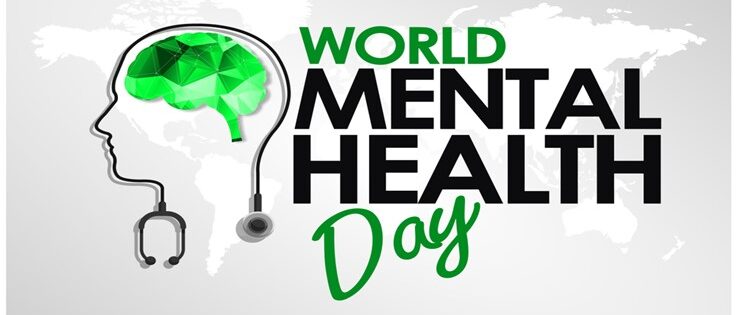The World is one large community of humans belonging to a different class, race, breed, gender, and religion and inequality is one of the evils breeding in this community. Discrimination in several forms has been faced by many people, including the ones diseased. Very often a mere absence of disease or any chronic health condition is considered as being healthy. But is that true? A Mental disorder is not visible that easily, does that make it any less chronic? Over 90 million Indians, or 7.5 percent of the country’s population of 1.3 billion, suffer from some form of mental disorder, according to the World Health Organization (WHO) and the worst thing is the stigma they face around it. It’s time to overcome this discrimination towards treating mental health as compared to other physical diseases or injuries. It’s time we promote “Mental health in this Unequal World“.
Sound mental health makes sure that a person feels productive; realises his/her capability at work; copes well with the daily stresses of life and contributes to the betterment of our society. However, inequalities in human development and limited access to mental health services have made it difficult to sustain strong mental health. A certain class of people like the health care workers who are prone to disordered lifestyles including the poor and needy being more vulnerable to the extremes of life are at a greater risk. This can lead to increased “premature mortality rates” indicating the potential years of life lost (PYLL) before the age of 70 years, especially death among the younger population failing to detect or treat mental disorders early in life. In fact “The Disability-adjusted life years” is 2,443 per 1,00,000 population, indicating years lived with a disability (YLDs) due to prevalent cases of the disease or health condition in a population.
This is the biggest risk to the productive & economic health of our country affecting its overall growth & development. According to WHO, the economic loss due to mental health conditions in India, between 2012 and 2030 is estimated at $1.03 trillion. Poor mental health can create suicidal tendencies, Indians account for more than one-fourth of deaths by suicide globally. The Covid-19 pandemic has taken a toll, according to the latest available data from UNICEF, globally, at least 1 in 7 children has been directly affected by lockdowns, while more than 1.6 billion children have suffered some loss of education. Diagnosed mental disorders, including ADHD, anxiety, autism, bipolar disorder, conduct disorder, depression, eating disorders, intellectual disability, and schizophrenia, can harm children and young people’s health, education, life outcomes, and earning capacity.
This theme, chosen for 2021 brings to the light the limited access to mental health services that remains unequal to 75% to 95% of people with mental disorders of low- and middle-income countries. The Government of India implemented the National Mental Health Program in 1982 to ensure availability and accessibility of minimum mental healthcare and improve human resources in mental health subspecialties. The total expenditure of GOI on mental health is about Rs 600 crore, including Rs 40 crore for the flagship National Mental Health Program.


What can we do on an individual level?
There have been numerous relaxation techniques that help to maintain a sound mental health including
- Meditation & developing coping skills
- Developing a sense of meaning and purpose in life
- Connecting with others
- Staying positive & Practicing gratitude


But all of these techniques can be effective only if you take care of your physical health that includes: –
- Being physically active: To enjoy the radiance of good health, you must exercise as it improves your ability to do daily activities and reduce health risks.
- Getting enough sleep: Poor sleep not only affects your mood & productivity but also increases the chances of obesity, stress, high blood pressure, diabetes, weight gain, memory issues, and weekend immunity. Hence, it’s necessary to have a regular sleep schedule and get enough quality sleep every night.
- Healthy eating: It’s okay to follow your heart but take your brain with you. Grabbing a quick snack at work or excessive junk food for satisfying your tongue adds very negligible nutritional value to our body and increases the chances of Loss of appetite and digestion; inadequate growth & development, obesity & other chronic diseases including negative mental impact leading to depression.
Not consuming plenty of nutrients may cater to mental illnesses. There is a link between low levels of vitamins and depression. Eating a well-balanced diet can help you to get enough of the nutrients you need. Vitamin B-12 from sunflower seeds, whole grains helps nerves and the brain to communicate effectively; Vitamin B-9 from beans, oranges & leafy vegetables helps to boost mood, fight heart diseases and preserve brain health. Zinc, Omega-3 fatty acids, Magnesium & vitamin D boosts energy, nerve health & overall immunity through their amazing antioxidant properties. If all our regular food like wheat; rice, milk, salt & oils are fortified by adding essential nutrients during their production, a major part of our population could lead a healthy life.
We at Hexagon Nutrition are firm believers in holistic nutrition! We have been tackling malnutrition since 1991 through our reliable and unmatched services to both domestic and international markets and we will continue to work towards new solutions to cater to the growing demand for holistic nutrition for better mental & physical health. We manufacture and market scientifically formulated brands across a 360-degree spectrum of illness, wellness, and lifestyle including disease management. To know more about our products & services, visit www.hexagonnutrition.com! Remember your mental wellbeing starts with you & within you. Invest in yourself, feel free to seek help, you deserve it! Start today, it’s never too late. We wish you a very Happy & Healthy World Mental Health Day.



